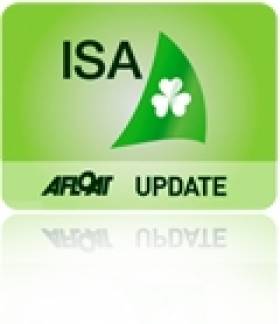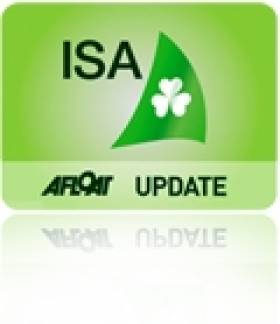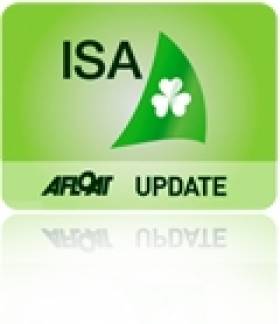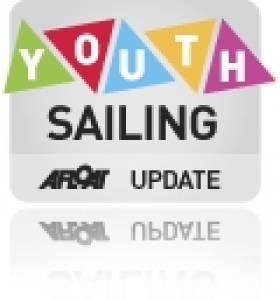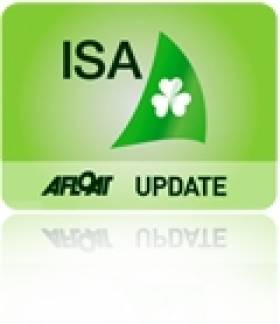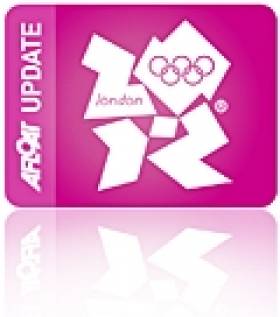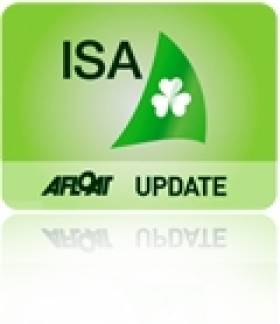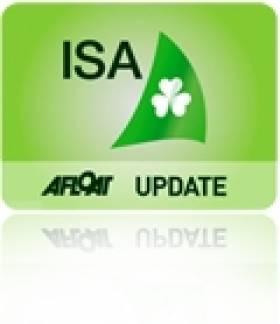Displaying items by tag: Irish Sailing Association
Proposal Seeks 'Shake-up' of ISA Policy to Stem Dinghy Sailing Decline
#isa – A full 'shake–up' for sailing is on the agenda at Saturday's Irish Sailing Association (ISA) agm when a former dinghy champion takes aim at current policies he claims are 'damaging the sport'.
GP14 and Mirror dinghy sailor Norman Lee, an active Wicklow boater with a reputation for introducing people to the sport in both dinghy and cruising boats, says he wants 'the ISA focus off elite sailing and the emphasis instead to be on enjoying sailing for fun as per the association's own articles of association'.
SCROLL DOWN FOR COMMENTS (AND ADD YOUR OWN) ON THIS ARTICLE
'I want a full shake-up. Lets take the focus off the Olympics and have a root and branch reappraisal of sail training'.
A failure to provide support and encouragement to clubs and class associations in all parts of the country has led to a decline in dinghy sailing numbers according to the proposal published by the ISA on its website. The agm notice is also downloadable as a word doc below.
The agm is scheduled for Saturday, March 2nd at the Royal Marine Hotel in Dun Laoghaire.
Lee is a member of Greystones Sailing Club, Dun Laoghaire Motor Yacht Club and Lough Derg Yacht Club.
Lee says he wants a proper reappraisal of the sport. 'The ISA needs to amend its policies and return to its original objectives of the amateur sport in Ireland'.
In particular Lee says the ISA currently has an over 'emphasis of the training of selected juveniles by the creation of elite squads of possible future Olympians'. This, says Lee, is without proper regard to the interests of those failing (for whatever reasons) to meet that standard or who are not able or cannot afford to give the time or family/financial commitment and this discourages people who are lost to the sport.
Lee says the ISA needs to refocus on the original objective set out in article 2 of its Memorandum of Association, which is 'to promote the amateur sport of sailing in Ireland' and amend its policies and practices to address the matters referred to."
The full proposal in accordance with the ISA's Article 33 is as follows:
"That the meeting recognises that the current policies being followed by the ISA are causing or contributing to the decline in numbers participating in dinghy racing by:-
Failing to structure the Association's sail training schemes so as to encourage as far as possible the continued participation of young participants in the sport, so as to make sailing a "sport for life". The system produces 'Instructors' who put no value on participation in club activities, continue to see themselves as 'Juniors' and have not been exposed to 'Senior' fleet sailing. Experience shows that those that have participated in 'senior' racing in their teens are much more likely to continue sailing or come back at a later stage.
Discontinuing the log book requirement for juniors to prove participation in club and Class events has contributed to a general lowering of standards and the demise of some junior classes.
Failing to provide necessary support and encouragement to clubs and classes associations in all parts of the Country for the provision and continuation of well managed and competitive dinghy racing at club and national level.
Emphasising the training of selected juveniles by the creation of elite squads of possible future Olympians, without proper regard to the interests of those failing (for whatever reasons) to meet that standard or who are not able or cannot afford to give the time or family/financial commitment and who are thereby discouraged and lost to the sport.
And that ISA refocus on the original objective set out in article 2 of its Memorandum of Association, which is 'to promote the amateur sport of sailing in Ireland' and amend its policies and practices to address the matters referred to."
Afloat.ie would like to hear from as many sailors as possible on the proposal raised by Norman. Please leave your comments on this story in the box below.
Celebrate Irish Sailing At The ISA Awards Ball
#ISA - Supporters of Irish sailing are asked to come together for a night of celebration and pay tribute to some of the outstanding contributors to sailing across six categories including the Mitsubishi Motors Club of the Year, Volunteer of the Year, Instructor of the Year and Training Centre of the Year.
Irish sailing's stars of tomorrow - such as ISAF Youth Worlds silver medallist Finn Lynch - are also in the running for the title of Youth Sailor of the Year.
Last year was an incredibly successful year for Irish sailing: 11 sailors represented Ireland at both the London Olympic and Paralympic Games, dozens of medals were claimed at events around the world and we played host to such high profile events as the ISAF Youth Worlds, the Volvo Ocean Race finale, the Tall Ships Race and the MOD 70s, to name but a few.
The ISA Awards Ball is the occasion to celebrate 12 months of successes and also launch the 2013 season in style. Tickets for the ball are €65 per person and must be booked by Friday 22 February 2013. Full details can be found at the ISA website HERE.
New Workshops For 7th ISA National Conference
#ISA - The ISA Dubarry National Conference is back for its seventh year with even more exciting and interesting seminars and workshop than ever before.
Taking place on 2 March 2013 at the Royal Marine Hotel in Dun Laoghaire, the conference is open to all with an interest in sailing, windsurfing and powerboating and is free to all ISA members.
A total of 20 interactive seminars and workshops will run throughout the day covering five different themes: Marketing and Events; Funding and Initiatives; Training; Race Management; and High Performance.
Whether you're involved in your club at committee level, you work in or run a training centre, you are involved in race management or are just a sailor looking to expand your skills and knowledge, there will be a range of diverse topics to suit all interests.
New for 2013 is a High Performance stream specifically for sailors with an interest in racing and performance. ISA team physic Mark McCabe will deliver a no-nonsense workshop on Strength & Conditioning followed by ISA team psychologist Kate Kirby who will discuss how mental factors can influence performance.
And Olympic 49er sailor Matt McGovern will talk about the highs and lows of London 2012 and how it has prepared him for his Rio 2016 campaign.
The conference is free to all members of the Irish Sailing Association but you must register in advance. Download the conference timetable and register online HERE.
ISA Youth Nationals Announced For Lough Derg
#YouthSailing - The ISA has announced that the 2013 Youth Nationals and Junior Pathway Championship will be held in Lough Derg Yacht Club from 2-5 April.
This will be the event's first visit to Lough Derg and looks set to be an exciting championship, and includes the Irish team trials for the ISAF Youth Worlds as well as various ISA squads.
Places will surely be hotly contested at the event, with many of the top performers from last year's championships in Dun Laoghaire such as Youth Worlds silver medallist Finn Lynch and All Ireland senior silver medallist Fionn Lyden in the running among a top-class field.
The event is also the ISA's prime showcase for its Performance Pathway scheme, with the 420, Laser Radial, Laser 4.7, Topper, Optimist and Feva all represented.
According to the IDA, 2012's championship "saw a remarkable fleet of over 250 boats in Dun Laoghaire, and Lough Derg is hoping to attract a similar number to Ireland's premier youth regatta."
ISA Chief Sees Bright Future for Irish Sailing
#IRISH SAILING - Irish Sailing Association (ISA) chief executive Harry Hermon took time out from the ISAF annual conference in Dublin this week to talk to Sport for Business about the growth of sailing in Ireland.
“2012 has been in many ways a breakthrough year for the sport,” he said. “We hosted so many major events during the year, from the Volvo Ocean Race finale in Galway to the World Youth Championships on Dublin Bay and of course it was an Olympic year and we had our strongest performance for many years.”
Aside from building on commercial partnerships, Annalise Murphy's near-medal-winning performance at the London Olympics was a boon for the profile of sailing in the public's imagination, and Hermon intends for the ISA to capitalise on this in the years to come, both for the Rio Games in 2016 and beyond.
“20,000 young people are coming through certified courses each year and staying with the sport," he said. "In addition we are reaching out to tens of thousands more through multi-activity camps ‘on the water’ around the coastal and inland waterways that are such an attribute in Ireland.
“We have a sport that enables 18-year-olds to race alongside their grandparents and few can offer such a crossover appeal.”
Sport for Business has much more on the story HERE.
Sailing Medals Could Bring In Big Sponsorship
#OLYMPICS - Ireland's impressive showings in aquatic sports at the London Olympics may be the key to bringing in much needed corporate sponsorship, as the Evening Herald reports.
Sailing in particular has yet to capture the public's imagination in the same way as track and field athletics or boxing.
But with 22-year-old Annalise Murphy riding high in first place in the Laser Radial standings and on course to take the gold medal, the sport's profile is rising - and headline sponsors will surely come following the lead of her personal sponsor Tayto, and new sailing supporter Providence Resources.
The oil exploration firm - which recently struck a black gold bonanza off the south coast - signed on as a "generous" sponsort of the Irish Sailing Association (ISA) earlier this year, which is just the ticket for what can be an expensive sport.
ISA performance director James O'Callaghan said that big-ticket sponsorship would be a welcome addition to the "vital" grants received from the Irish Sports Council.
"The results that Annalise has had so far show how our teams are able to compete on an international level," he added.
"I think it's a good package for any sponsor. They are a really young team with Annalise, the 49ers and then we got a medal in the Youth Worlds in July for the first time in 16 years."
The Evening Herald has more on the story HERE.
ISA To Receive Sports Capital Programme Funding in 2012
#ISA FUNDING - The Irish Sailing Association will receive a special allocation of €70,000 through the Sports Capital Programme for 2012, it has been announced.
Deputy Michael Ring, Minister of State at the Departent of Transport, Tourism and Sport, made the declaration in response to a parliamentary question from Terrence Flanagan TD in reference to what grant aid will be awarded to Ireland's larger sporting bodies.
As expected, Gaelic games and soccer will receive the bulk of Government investment in 2012, adding up to a total of more than €5.5 million between them.
Meanwhile, both Badminton Ireland and the Irish Sailing Association (ISA) will receive special allocations of €40,000 and €70,000 respectively under the deparment's Sports Capital Programme (SCP).
This award is in addition to the funding received by the ISA via the Irish Sports Council, of which the core grant funding in 2012 totalled €447,313 - with additional grants of €600,000 in high performance funding; €220,000 in direct athlete investment funding; and €21,000 in 'women in sport' funding.
No other allocations under the SCP have been made to national governing bodies in 2012 thus far.
#ISA NEWS - The Irish Sailing Association's Olympic Department is inviting tenders for photographic services and social media content for the Irish sailing team at the Sail for Gold Regatta in Weymouth from 4-9 June.
The tender requires attendance at Sail for Gold from Wednesday 6 to Saturday 9 June inclusive.
The photography portion involves daily coverage of Irish sailors racing with a target of 6-10 images per sailor (schedule to be agreed with support team dependant on campaign performance and availability of media boats), plus headshots of the squad and support teams in team clothing, and group shots with and without support teams.
Social media content will involve daily pre-race audio and video with the performance director; daily audio/video with sailors from the media zone; and a micro documentary (3 minutes max) on pieces of interest from an Irish perspective.
Applications for this tender should be emailed to [email protected] by the closing date tomorrow, Friday 13 April 2012. A decision will be made before 20 April to allow time for accreditation and registration for media boats.
Full details on requirements and details of rights and pricing are available on the ISA website HERE.
ISAF Posts Review of Development Symposium
#DEVELOPMENT - The International Sailing Federation's (ISAF) inaugural Development Symposium at Howth Yacht Club recently "promised much in the way of passionate discussion", according to its review of the two-day event.
Presentations were given by Tony Wright, training manager of the Irish Sailing Association, who outlined the ISA's national programme that keeps the focus of the sailor "at the centre of all that they do"; and Simon Jinks who walked through his new Guide to Offshore Personal Safety for Cruising and Racing.
Meanwhile, World Youth Sailing Trust coach Hugh Styles spoke on the subject of cohesive training programmes adding value to international events and leaving a legacy for host nations and teams alike.
Participants from the federation's member nations kept an 'ideas bank' which listed development ideas for future consideration, including a proposal for a development forum for sailing coaches, and using the model of the European Qualifications Framework as a reference for coaching competencies.
New Zealand, South Africa, Iceland and Turkey were also suggested as locations for future symposiums.
For more see the full review of the Development Symposium at the ISAF website HERE.
Big Events Get More on the Water
#SAILING – Enda O'Coineen (pictured above), Chairman of the group bringing the Volvo Ocean Race (VOR) to Galway this summer, attended last Saturday's Irish Sailing Association AGM – and believes we need to radically rethink how we spend our resources to develop the sport of sailing in Ireland.
There were some interesting points at the ISA Annual General Meeting on 3 March, ranging from the brilliant to the begrudging.
One suggested that Twitter messages to the general meeting should be "banned". Another more reasonable voice queried that, given that the ISA has some 20,000 members through clubs and only about 50 at the general meeting, why not broadcast the AGM on the web (the cost would be little) and get engagement at all levels?
Certainly one thing is clear: we need to radically rethink how we spend our resources to develop. We need to ask how we can do this, and we need to connect with the ISA National Authority to make it happen.
One strong point made at the meeting by Martin Byrne, Commodore of the Royal St George Yacht Club, is that great events being hosted in Ireland show our sport at its best. These platforms should be used to get newcomers into the sport.
And that's the dilemma. For instance, Cork Week and the ISAF Youth Worlds are perfect platforms, but the high participation level and high activity from the respective organisations means that those running them are simply too busy to do it.
Meanwhile, the Volvo Ocean Race and Global Village 2012 are the complete opposite - a mass consumer gala public event with a massive media imprint.
There are claims that money extracted from Government and used to pay hosting fees for the likes of the VOR would be better spent at other events. It's a valid point, but it's wrong. What happens is misunderstood - these are extra funds won based on the proven financial return, which has been well established. It's an extra allocation, based on hard facts, that would not normally have come into our sport.
Personally I would prefer Cork Week or the ISAF Worlds for pure sport. For the VOR, it's the reverse - pure spectacle. The six Formula-1-style racing teams are promotional and professional machines that run like clockwork on a massive scale. All eyes will be on Galway for the week, that's a fact.
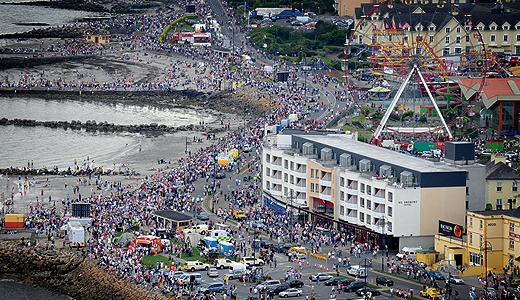
The scenes at Salthill, Galway for the last arrival of the Volvo fleet in 2009. Photo: Rick Tomlinson
And what's more, we have taken Martin Byrne's suggestion. A key focus for us as organisers - led by David Vinnell, Commodore of Galway Bay Sailing Club - has been to get 10,000 people on the water. To back it up, we also have a special safety drive with the IWSA and the RNLI, a VOR Galway partner charity along with the Ocean Youth Trust.
This activity - in addition to the Global Village themes of Innovation, Food, Green and Marine - is enormous. It will surely make for a dynamic event and a great contribution to our sport, where the ocean meets Broadway and Wall Street – and lot of fun to boot! Come join us from 30 June to 8 July.
Enda O'Coineen is chairman of Let's Do It Global, a non-profit group with a mission to develop a long-term legacy from the Galway's hosting of the Volvo Ocean Race (www.letsdoitglobal.com)
See also:
How can clubs cash in on sailing's spectator appeal?



























